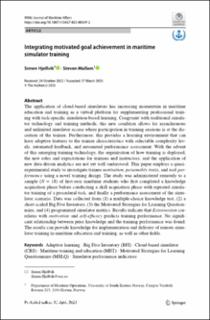| dc.contributor.author | Hjellvik, Simen | |
| dc.contributor.author | Mallam, Steven | |
| dc.date.accessioned | 2024-04-08T12:07:59Z | |
| dc.date.available | 2024-04-08T12:07:59Z | |
| dc.date.created | 2023-05-02T14:24:19Z | |
| dc.date.issued | 2023 | |
| dc.identifier.citation | Hjellvik, S., & Mallam, S. (2023). Integrating motivated goal achievement in maritime simulator training. WMU Journal of Maritime Affairs, 22(2), 209-240. | en_US |
| dc.identifier.issn | 1651-436X | |
| dc.identifier.uri | https://hdl.handle.net/11250/3125297 | |
| dc.description.abstract | The application of cloud-based simulators has increasing momentum in maritime education and training as a virtual platform for supplementing professional training with task-specific simulation-based learning. Congruent with traditional simulator technology and training methods, this new condition allows for asynchronous and unlimited simulator access where participation in training sessions is at the discretion of the trainee. Furthermore, this provides a learning environment that can have adaptive features to the trainee characteristics with selectable complexity levels, automated feedback, and automated performance assessment. With the advent of this emerging training technology, the organization of how training is deployed, the new roles and expectations for trainees and instructors, and the application of new data-driven analytics are not yet well understood. This paper employs a quasi-experimental study to investigate trainee motivation, personality traits, and task performance using a novel training design. The study was administered remotely to a sample (N = 18) of first-year maritime students who first completed a knowledge acquisition phase before conducting a skill acquisition phase with repeated simulator training of a procedural task, and finally a performance assessment of the simulator scenario. Data was collected from (1) a multiple-choice knowledge test, (2) a short-scaled Big Five Inventory, (3) the Motivated Strategies for Learning Questionnaire, and (4) programmed simulator metrics. Results indicate that Extraversion correlates with motivation and self-efficacy predicts training performance. No significant relationship between prior knowledge and the training performance was found. The results can provide knowledge for implementation and delivery of remote simulator training in maritime education and training, as well as other fields. | en_US |
| dc.language.iso | eng | en_US |
| dc.rights | Navngivelse 4.0 Internasjonal | * |
| dc.rights.uri | http://creativecommons.org/licenses/by/4.0/deed.no | * |
| dc.title | Integrating motivated goal achievement in maritime simulator training | en_US |
| dc.type | Peer reviewed | en_US |
| dc.type | Journal article | en_US |
| dc.description.version | publishedVersion | en_US |
| dc.rights.holder | © The Author(s) 2023. | en_US |
| dc.source.pagenumber | 209-240 | en_US |
| dc.source.volume | 22 | en_US |
| dc.source.journal | WMU Journal of Maritime Affairs (JoMA) | en_US |
| dc.source.issue | 2 | en_US |
| dc.identifier.doi | https://doi.org/10.1007/s13437-023-00309-2 | |
| dc.identifier.cristin | 2144753 | |
| cristin.ispublished | true | |
| cristin.fulltext | original | |
| cristin.qualitycode | 1 | |

